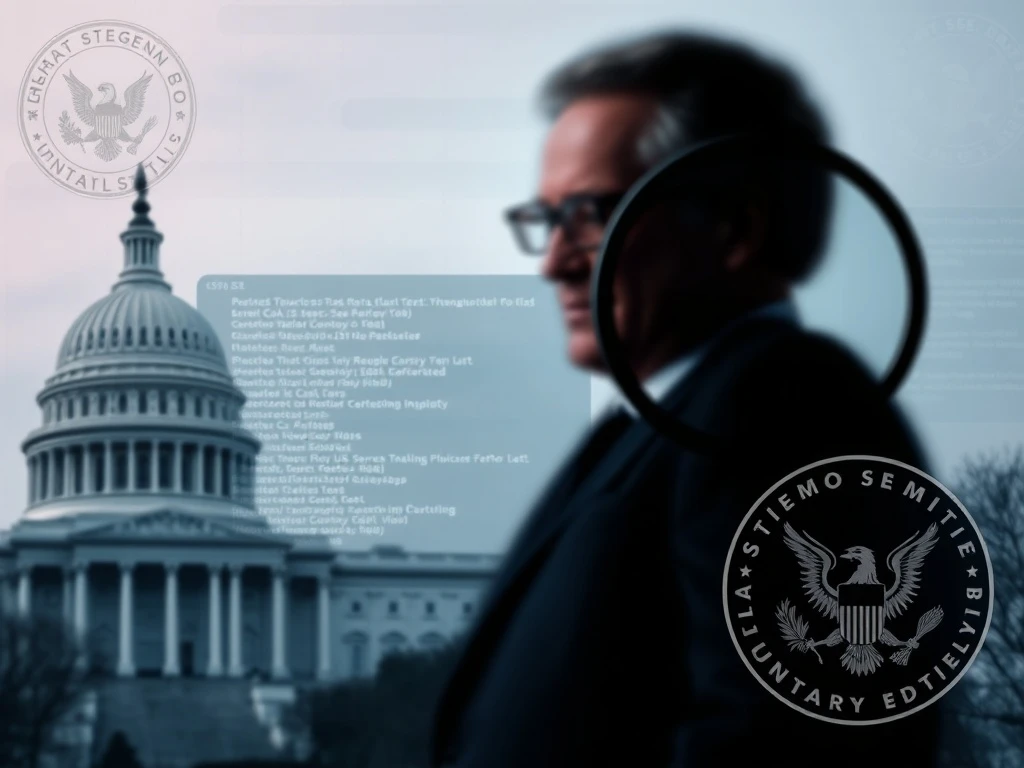Gary Gensler: Republicans Demand Answers Over Shocking SEC Deleted Texts

The cryptocurrency world often faces intense regulatory scrutiny. Now, a significant development casts a shadow over the very body tasked with oversight. House Republicans are deeply investigating Gary Gensler’s tenure as SEC Chair. This probe focuses on crucial missing communications. Specifically, they are looking into SEC deleted texts from his government-issued phone. These actions raise serious questions about the agency’s operational integrity.
House Republicans Launch Crucial Probe into Gary Gensler’s Deleted Texts
A prominent group of House Republicans recently announced a formal investigation. Specifically, they are actively engaging with the SEC’s Office of Inspector General (OIG). The primary goal, therefore, is to uncover more details about former SEC Chair Gary Gensler’s missing text messages. This inquiry indeed stems from findings in early September. These findings consequently questioned the transparency and integrity of the Gensler-led SEC. His term ran from 2021 to 2025. House Financial Services Committee Chairman French Hill subsequently confirmed the investigation. He then sent a letter to current SEC Chair Paul Atkins on Tuesday. The committee aims to understand the OIG’s report better. Moreover, they seek clarity on outstanding questions. Furthermore, they want to discuss areas needing additional oversight and investigation. This House Republicans SEC probe thus highlights significant concerns.
Unpacking the Controversy: Why SEC Deleted Texts Matter
The disappearance of official communications is a serious matter for any government agency. For the SEC, it carries particular weight. Many in the crypto industry have long accused Gary Gensler of bias. They believe he spearheaded a Biden administration effort. This plan allegedly pressured banks to limit services to crypto businesses. His SEC also initiated numerous lawsuits against crypto companies. These actions, critics argue, stifled innovation. The deleted texts fuel these accusations. They suggest a potential lack of SEC transparency. Republicans specifically highlight a clear double standard. Gensler pursued financial firms for “widespread record-keeping failures.” He collected over $400 million in fines in 2023 alone. Yet, his own agency seemingly failed to meet these standards. This discrepancy forms a central part of the current probe.
The Critical Link to Crypto Enforcement Actions
Perhaps the most alarming revelation involves the content of the missing messages. The OIG discovered that some of Gary Gensler’s deleted texts pertained directly to SEC enforcement actions. These actions targeted crypto companies and their founders. This means vital communications may be lost forever. We may never fully understand how and why the SEC pursued these significant cases. The crypto community has already expressed frustration. They often perceive Gensler’s regulatory approach as enforcement-first, without clear guidelines. The loss of these specific records only deepens their concerns. It casts doubt on the fairness and due process of past crypto enforcement actions. This situation complicates efforts to rebuild trust between regulators and the innovative digital asset sector.
Technical Blunders and Systemic Failures at the SEC
The OIG’s report did not attribute malicious intent for the deletions. Instead, it pointed to systemic failures within the SEC’s IT department. An “automated policy” was poorly understood and implemented. This policy triggered a complete wipe of Gensler’s government-issued mobile phone. The wipe consequently deleted text messages from October 2022 to September 2023. The report detailed several contributing factors. These included:
- Poor change management: Inadequate oversight of system updates.
- Lack of proper backup devices: No reliable method to preserve data.
- Ignored system alerts: Warnings about potential data loss went unheeded.
- Unaddressed vendor software flaws: Known issues were not resolved.
This technical negligence further compounds the issue of SEC deleted texts. It mirrors another recent security incident. In January 2024, a hacker compromised the SEC’s X account. They posted false news about spot Bitcoin ETF approvals. X later confirmed the breach happened because the SEC lacked two-factor authentication. Both incidents highlight significant IT vulnerabilities and a need for improved internal protocols.
Demands for Accountability: House Republicans SEC Probe Intensifies
The ongoing House Republicans SEC probe signals a firm demand for greater accountability. Committee Chairman Hill and other ranking members emphasize this point. They argue that government agencies must adhere to the highest standards. This includes meticulous record-keeping. The lack of proper documentation from the former Chair’s office undermines public trust. It also hinders proper oversight. This investigation seeks to ensure that such lapses do not recur. It also aims to provide clarity on past decisions. For the financial markets, transparent regulatory bodies are essential. They foster stability and confidence. This probe represents a critical step towards reinforcing those principles. It aims to prevent future instances of missing information. This is especially true when discussing sensitive crypto enforcement actions.
The Broader Implications for SEC Transparency
Beyond the immediate investigation, this incident carries wider implications. It underscores the fundamental importance of SEC transparency. Public trust in regulatory bodies depends on their openness. When crucial communications vanish, it erodes this trust. It raises questions about fairness and equal application of rules. The principle of E-E-A-T (Experience, Expertise, Authoritativeness, Trustworthiness) applies strongly here. Government agencies must demonstrate these qualities. They must be trustworthy custodians of public information. This incident challenges that perception. It prompts a necessary re-evaluation of internal controls. Furthermore, it demands a commitment to digital record integrity. The financial sector, particularly the rapidly evolving crypto space, requires clear and accessible regulatory records. This ensures all stakeholders operate on a level playing field.
The House Republicans SEC probe into Gary Gensler’s deleted texts continues to unfold. This investigation is more than a political dispute. It represents a crucial examination of regulatory integrity. The crypto industry, in particular, watches closely. They hope for greater clarity and accountability. The outcomes will likely shape future expectations. They will also influence standards for digital record-keeping within government agencies. Ultimately, the pursuit of SEC transparency remains paramount. This ensures fair and effective oversight for all market participants.







